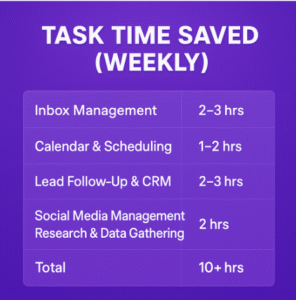5 Simple Tasks That Steal 10+ Hours Every Week (and How to Take Them Back)


I speak with business owners every single week who sound the same:
“I’m working nonstop… but it feels like I’m not moving forward.”
Here’s what usually comes up: It’s not because they’re lazy or unfocused. These are smart, driven people. But here’s what’s really happening:
It’s not the “big” projects that drain them. It’s the small, everyday tasks that pile up.
Emails, scheduling, follow-ups and so many more microtasks. They don’t look dangerous on their own, but together? They eat entire days.
And the worst part? These tasks don’t just steal time. They steal clarity. They make every day feel like firefighting instead of leading
The Trap Leaders Fall Into
If you’ve ever ended a 12-hour day and thought, “I was busy all day but I didn’t actually move the needle,” you know the trap.
Here’s how it feels when you’re stuck in it:
- Your inbox pings all day, but you barely touched the big project that actually drives revenue.
- You spend hours scheduling meetings only to realize your calendar is controlling you.
- You let another follow-up slip, knowing that’s a deal that just got colder.
- You start dreading Sundays because they’re not rest days—they’re prep days.
You tell yourself it’s temporary. “Once this season passes, I’ll get ahead.”
But let’s be honest: that season never ends.
And if it continues?
- Deals get lost because follow-ups fall through the cracks.
- Your team burns out because they don’t know what matters most.
- You, the leader, spend your best hours chasing tasks instead of building strategy.
That’s not leadership. That’s survival.
The Hard Truth About Small Tasks

According to Slack (a Salesforce company), small business owners lose an average of 96 minutes of productivity per day, that’s almost 8-11 hours lost per week.
That’s an entire workday gone. Every. Week.
And the irony? It’s never the “CEO-level” work that gets sacrificed—it’s the visionary thinking, the growth planning, the work only you can do.
You don’t lose time on the meaningless. You lose time on the necessary-but-low-value. That’s why this trap is so sticky.
Why Delegation Compounds Like Interest
Think of delegation like compounding interest.
- Week 1: You delegate one task and save 2 hours.
- Week 2: You delegate a second task and save 4 hours.
- Week 4: You’ve freed up nearly a full workday without working later nights.
This is the magic that most busy entrepreneurs miss.
Every hour you reclaim multiplies. And the ROI isn’t just in hours—it’s in focus, decision-making, and energy.
The 5 Silent Time Thieves (and How to Take Them Back)

1. Inbox Management (2–3 Hours Saved Weekly)
The average CEO spends 10+ hours a week in email. That’s a day lost.
It feels like constant interruptions, never getting into deep work, inbox guilt when you miss something.
If this continues, important messages get buried, deals slow down, and you become reactive instead of strategic.
Solution:
- Delegate filtering so only high-value emails hit your desk.
- Hand off routine replies (shipping info, meeting confirmations, client check-ins).
- Unsubscribe ruthlessly.
Inbox management isn’t about reading less, it’s about reading only what matters
2. Calendar & Scheduling (1–2 Hours Saved Weekly)
You think, “How hard can scheduling be?” Until you’ve spent 30 minutes swapping three emails just to lock in one meeting.
It’s like dying by a thousand cuts, back-to-back calls, no buffer to think.
If this continues, your days are controlled by others’ agendas. You lose white space for vision.
Solution:
- Delegate scheduling, confirmations, reminders, and prep notes.
- Protect white space on your calendar like it’s a client meeting.
- Use tools, but have someone manage the exceptions.
Your calendar should serve you, not the other way around.
3.Lead Follow-Up & CRM Updates (2–3 Hours Saved Weekly)
You already know this one: “The fortune is in the follow-up.” Yet most leaders admit they drop it. Not because they don’t care because they’re out of bandwidth.
What it feels like: guilt every time you think of leads you haven’t touched.
Over time, money is left on the table, close rates drop, and competitors win deals you should have closed.
Solution:
- Delegate logging call notes.
- Have someone send follow-ups within hours, not days.
- Assign nudges for prospects who go quiet.
Leads aren’t lost because they’re cold. They’re lost because they’re forgotten.
4. Social Media Posting (2 Hours Saved Weekly)
Social media isn’t optional for leaders anymore, it’s credibility. But showing up consistently eats time.
Stress every week trying to “come up with something” and guilt when you go silen is a battle many CEOs face.
If this continues, your visibility fades, competitors dominate the conversation, and your credibility suffers.
Solution:
- Hand off posting, scheduling, and engagement.
- Save your voice for the high-level thought leadership only you can create.
Delegation here doesn’t dilute your brand, it multiplies it.
5. Research & Data Gathering (1–2 Hours Saved Weekly)
Research doesn’t look urgent, but it’s a hidden drain.
- Finding vendors and comparing prices
- Gathering client intel before a call
- Tracking competitors and industry trends
Are these necessary tasks? Yes, but not always the best use of your time
Market scans, competitor checks, vendor comparisons—they don’t feel urgent, but they chew up hours.
It all feels like scattered tabs, unfinished research, analysis paralysis.
With this as an everyday problem, decisions slow down, and opportunities slip while you’re still comparing vendors.
Solution:
- Delegate research collection, competitor updates, and vendor sourcing.
- Only review the summary and key takeaways.
Leaders should make decisions, not collect data.

Take a look at the bigger picture:
None of these tasks are complicated.
But together, they can take 10+ hours off your week.
That’s not just time, that’s energy, that’s focus.
And when you protect those, you can actually spend them on what grows the business.
How to Start Without Overwhelm
The #1 objection I hear is: “It’ll take too long to teach.”
But the reality is: recording a 20–30 minute Loom video to show your process once can save you hundreds of hours over the next year.
Start with one simple handoff, even if it’s just calendar management. The time you save there will create space to delegate the next thing.

The ROI of Letting Go
Think about it this way: if your time is worth $100 an hour, saving 10 hours a week is $1,000 back in your pocket.
Even after investing in skilled support, the return is enormous.
That’s not just ROI in dollars—it’s ROI in clarity, energy, and leadership.
Multiply the impact of the time you keep up with Gotocalls.
Your to-do list will never end. But your energy will.
Pick one of the five tasks above and delegate it this week.
Don’t overthink it. Just start.
The leaders who scale are the ones who stop hoarding every task. They invest their best hours in vision, not in inboxes.

